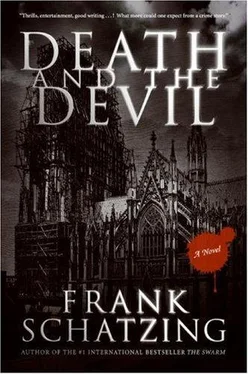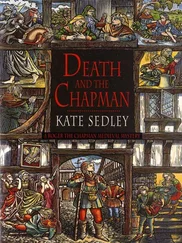“What’s that got to do with all this?”
“It would take me so long to explain, I might as well go and present myself at the Tower. It’s got everything to do with it, take my word for it.”
Bodo looked around nervously. “You’ll have to tell me more if I’m to help you.”
“You’ll help us? Excellent!”
“I’ll help you ,” said Bodo. “Who else?”
“Jacob here. Richmodis and Goddert. We need time.”
“And how do you think you’re going to get that?”
“Did Theoderich’s people say anything about Richmodis or Goddert being involved?”
“Nonsense. It’s just you they want. What would your relatives have to do with it?”
“All the better. Then you can do something for us. Jacob and I, we need somewhere to hide.”
“Somewhere to hide?” Bodo echoed in surprise. “Just a moment, I—”
“I was thinking of Keygasse. Your brewery.”
“But—”
“Now. Right away. No time to lose. Do we need a key or is somewhere open?”
“Are you out of your mind?” Bodo hissed. “When I said help, I meant I’d put in a good word for you.”
“Good words are no use to us.”
“Christ Almighty, Jaspar!” said Bodo despairingly. “Do you know what you’re asking? If it comes out that I hid a suspected murderer, I can say good-bye to my position as magistrate.”
“Yes, and you can say good-bye to your head, too. Do it anyway. Anything else would be a mistake.”
Bodo gasped and held his head, as if to make sure it stayed there. “Oh, damnation!” he said.
“The keys,” Jaspar repeated.
“Infernal damnation!”
“It won’t help, however often you repeat it. I give you my word I didn’t murder my servant. There’s a foul plot going on, people have died, and someone’s going to be the next if we don’t stop it.” He gave Bodo a meaningful look. “It might even be you.”
“Me? Saints preserve us, why me?”
“Because Gerhard Morart was murdered,” Jaspar whispered, “and because so far hardly anyone who knew has lived long enough to tell the tale. Now you know, too.”
Bodo shook his head in disbelief.
“Quick,” Jaspar urged. “Make up your mind what you’re going to do, but do it!”
Bodo looked at Jacob as if he could release him from the nightmare he had blundered into. Jacob shrugged his shoulders. “Jaspar’s right,” he said.
Bodo’s oath made the air turn blue. “I don’t believe it. Here I am and—oh, bugger it! The shed next to the brewery is open. There are no barrels in it at the moment, so the dogs won’t bite you. But Jaspar”—he held his fist under Jaspar’s nose—“you’re gone by tomorrow morning. I don’t care what you do then.”
Jaspar threw out his arms and, to his friend’s surprise, embraced the brewer.
“And if you’re having me on”—Bodo’s muffled voice came from the folds of Jaspar’s habit—“I’ll string you up with my own hands, and that carrot-top sidekick of yours.”
“Thank you, my friend.”
“Is that clear?”
Jaspar gave Jacob a quick glance. “What was that nice turn of phrase you had? Clear as the waters of the Rhine. Bodo, if anyone asks, we escaped just as you were about to arrest us. Keep an eye on Goddert and Richmodis, won’t you, and tell Richmodis we’re safe. Keep a good eye on them.”
“Of course.” Bodo sighed. “Of course. And I’ll carry the cathedral across the Rhine and find a wife for the pope. I must be out of my mind. You’d better clear off, before I change it.”
They trotted off, not looking around once.
Some time later, just after they had passed the convent of the White Sisters and were approaching Keygasse, Jaspar turned to Jacob and said, “Just while we get our breath back, what do you think the patricians are going to do, Fox-cub?”
Jacob looked at him. “Isn’t it obvious? Kill the archbishop.”
Somewhere a cock crowed.
“Too soon,” muttered Johann.
He had crept up to Blithildis’s room, torn between the desire to wake her up and fear of what she would say. She was asleep. Or appeared to be. She hadn’t said a word nor moved when he came in, but that didn’t necessarily mean anything. Often she sat listening; she could hear things in the quietness that were hidden from others. She had the gift of going inside time and hearing things. The future became the past and the past the future.
Once his eyes had adjusted to the darkness, he could observe her face. It looked more like a death mask than ever. He felt no terror at this, only sadness that God let her suffer instead of taking her to Him.
He did not want to lose her, yet he would be happy for her to be reborn in Christ, to find peace.
Or was it his own peace he hoped to find when she was taken from them?
Their goal. The cause.
It was Blithildis’s idea. After Conrad had imposed stricter conditions on the imprisoned patricians it was obvious to everyone that he would never pardon them as long as he lived. And Conrad von Hochstaden was tough. His seal, showing him with God’s hand poised in blessing above his head, was a reflection of his inordinate self-esteem, and he had made no secret of his profound hatred of the patricians. He was not concerned with justice. He had made an example of them as a demonstration of his power, to show anyone who challenged his authority what they could expect.
That evening Blithildis had remonstrated with them for celebrating. “How can you celebrate,” she had said, “when our people go in fear of their lives, in exile or rotting away in cold, damp dungeons? How can these costly wines not turn to vinegar on your tongues when that ungodly archbishop is depriving the noble houses of their liberties, cheating them out of their privileges, plundering them, breaking his word, and dragging everyone’s honor through the mud? How can you let them numb your senses when the once proud city of Cologne is being turned into a sink of fawning and treachery, ruled by fear? How can you congratulate yourselves on your business deals when no one dare speak his mind openly anymore for fear Conrad might have him taken and executed on the spot?”
She had shamed them all, then pursued her reflections to their logical conclusion. If Conrad were to die, everything would change overnight. The exiles and prisoners could return home. A new, stable order would be set up in Cologne, a patrician order, in which everyone had their place and which a new archbishop would be powerless to prevent. Did people not say that Conrad, despite his show of authority, was the last hope of the Church in Cologne? If he did not succeed in restoring the old power of the archbishops, no successor would.
That evening the chance gathering had been molded by Blithildis into an alliance, whether they wanted it or not. They had all, apart from Gerhard, been carried away. The patricians would triumph! Yes, they had made mistakes, but you could learn from mistakes. It was a cause worth fighting for. It was even a cause worth killing an archbishop for.
At least it had been. But what was right?
“I can hear your breathing,” Blithildis whispered.
So she had been awake. Was it his imagination, or did her voice sound weaker than usual?
Johann tensed. “And what does it tell you?”
“That you’re still worrying.”
He nodded. It was strange. He always behaved as if she could see him.
“Things have happened, Mother,” he said. “You’ve been asleep. Matthias has been to see Urquhart. The hostage has escaped and it looks as if we have problems with Kuno as well.”
“Kuno is nothing,” replied Blithildis. “I know you’re worrying whether the cause—”
Johann corrected her. “You mean murdering Conrad.”
Читать дальше












